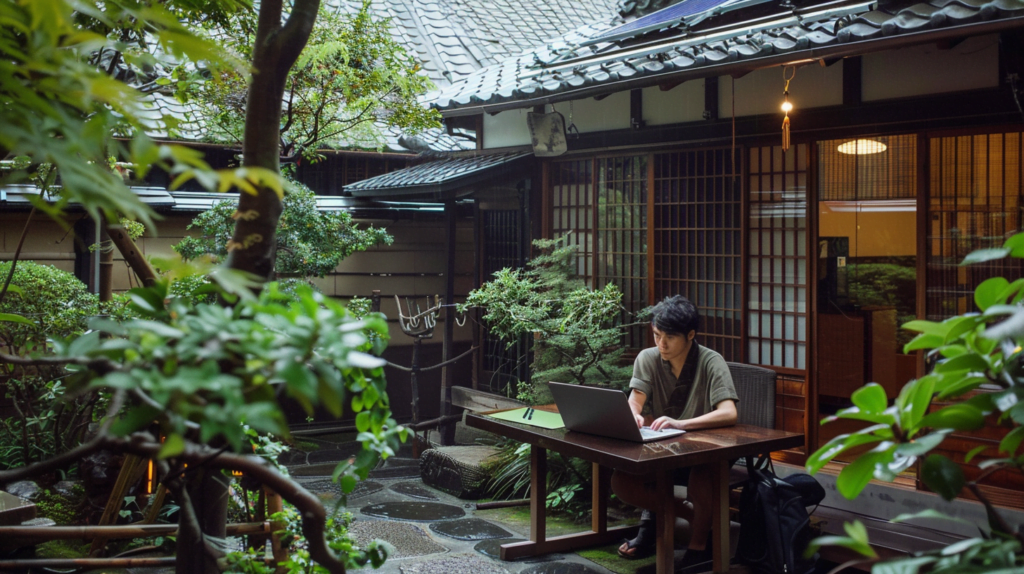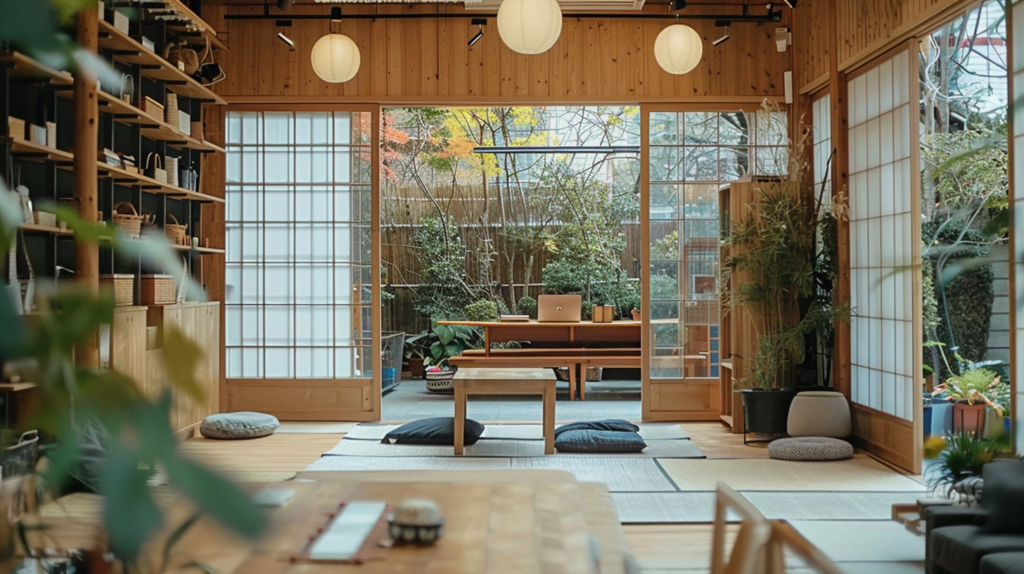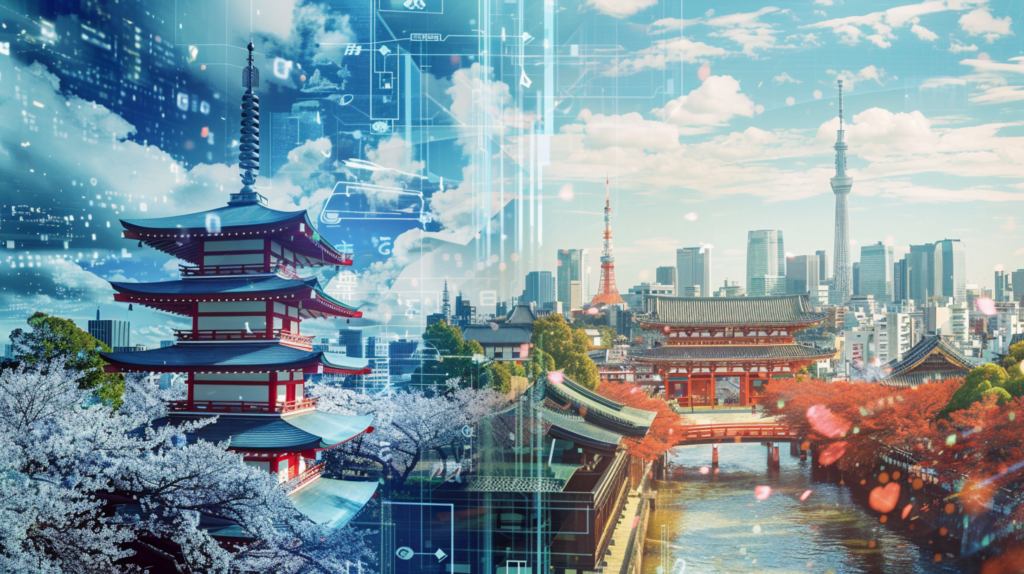Welcome to EcoNomadic Wanderer. Navigating the path to becoming a digital nomad is an exciting journey, and obtaining a Digital Nomad Visa in Japan can be your gateway to combining work and travel in one of the world’s most dynamic countries. In this ultimate guide, we’ll explore everything you need to know about securing a Digital Nomad Visa in Japan, from eligibility requirements to the application process and tips for making the most of your stay. Whether you’re a freelancer, entrepreneur, or remote employee, this comprehensive resource will help you take the next step in your digital nomad adventure.

Introduction:
In recent years, the allure of becoming a digital nomad has captivated countless adventurers seeking to merge work with wanderlust. Among the myriad destinations embracing this trend, Japan stands out with its unique blend of ancient tradition and cutting-edge technology. As an avid traveler and a proponent of sustainable travel, my journey through the Land of the Rising Sun under the new digital nomad visa not only reshaped my professional life but also deepened my cultural connections.
Having navigated the bustling streets of Tokyo and the serene paths of Kyoto, I’ve experienced firsthand the benefits and challenges of Japan’s digital nomad visa. In this comprehensive guide, I’ll share essential insights and personal anecdotes to help you leverage this opportunity, ensuring your venture into nomadic life in Japan is as fruitful as it is memorable.
Personal Experiences

During my stay in Japan, I had the opportunity to explore various aspects of sustainable living, each experience enriching my journey as a digital nomad. One memorable experience was staying at a traditional guesthouse in Kyoto. This guesthouse, known as a ryokan, was not only a serene retreat but also a model of eco-friendly practices. From the moment I arrived, I was impressed by the solar panels discreetly integrated into the traditional architecture, providing clean energy for the entire establishment.
Mornings at the ryokan began with a delicious breakfast made from locally sourced, organic ingredients. The owner, Mrs. Nakamura, was passionate about supporting local farmers and reducing food miles. She often shared stories about the origins of the ingredients, from the rice grown in nearby paddies to the fresh vegetables from her garden. This not only provided a healthy start to my day but also deepened my connection to the local community and its sustainable practices.
Another highlight was my time in Tokyo, where I discovered the vibrant co-working scene. I frequented a co-working space in Shibuya, a bustling district known for its innovation and creativity. The space, called “GreenDesk Tokyo,” was designed with sustainability in mind. It featured energy-efficient lighting, furniture made from recycled materials, and an extensive recycling program. The community at GreenDesk Tokyo was diverse, with digital nomads from all over the world. We often exchanged tips on sustainable travel, remote work, and living a minimalist lifestyle.
One evening, I attended a workshop on upcycling, organized by GreenDesk. The workshop was led by a local artist who demonstrated how to transform everyday waste materials into beautiful and functional items. Inspired by the session, I started incorporating upcycling into my routine, turning empty bottles into planters and old magazines into creative art pieces. This not only reduced my waste but also added a personal touch to my temporary living spaces.

Exploring Japan’s natural beauty was another aspect of my sustainable journey. I spent a weekend in the Japanese Alps, hiking through pristine forests and staying at an eco-lodge. The lodge, nestled in the mountains, was a perfect example of harmony with nature. It was built using locally sourced, sustainable materials and operated on renewable energy. The lodge offered guided tours that emphasized Leave No Trace principles, educating guests on how to minimize their environmental impact while enjoying the outdoors.
During one of these hikes, I met Hiroshi, a local guide passionate about conservation. He shared insights into Japan’s efforts to protect its natural landscapes and wildlife. Hiroshi’s dedication inspired me to adopt more sustainable habits, such as reducing plastic use and supporting conservation projects. His stories of the local flora and fauna added a layer of appreciation to the stunning scenery around us.
In Osaka, I discovered the concept of “mottainai,” a Japanese term that expresses regret over waste. This principle is deeply ingrained in Japanese culture and encourages the efficient use of resources. I stayed with a host family who practiced mottainai in their daily lives. They taught me simple but effective ways to reduce waste, such as composting food scraps and repurposing old clothing. Living with them, I realized how small changes in daily habits could significantly reduce my ecological footprint.
One of the most impactful experiences was visiting a zero-waste town called Kamikatsu. This small town has implemented an ambitious waste management program, with residents separating their waste into 45 categories for recycling. The community’s commitment to zero waste was evident everywhere, from the meticulous sorting stations to the upcycled products sold in local shops. I spent a day volunteering at the recycling center, learning firsthand the importance of waste separation and the potential for creating new products from recycled materials. The residents’ dedication to sustainability was truly inspiring, and it reinforced my resolve to adopt similar practices in my travels and daily life.
Throughout my journey in Japan, I found that embracing sustainability not only enhanced my travel experience but also fostered a deeper connection with the local culture and community. By living and working sustainably, I was able to enjoy the beauty and innovation of Japan while contributing positively to the environment and society.
Understanding the Digital Nomad Visa in Japan

What is a Digital Nomad Visa in Japan?
A digital nomad visa is a type of visa that allows remote workers to live and work in a foreign country legally. Unlike tourist visas, these visas typically last longer and offer more flexibility for work-related activities. Japan’s digital nomad visa is particularly attractive due to the country’s vibrant culture, excellent infrastructure, and innovative technology scene.
Why Japan for Digital Nomads?
Japan’s appeal as a destination for digital nomads lies in its seamless integration of cutting-edge technology with centuries-old traditions. The country’s infrastructure supports high-speed internet access even in remote areas, making it ideal for remote work. Additionally, Japan’s commitment to sustainability aligns perfectly with the values of eco-conscious travelers.
Specifics of Japan’s Visa Policy
Japan’s digital nomad visa is designed to attract highly skilled remote workers. It offers the ability to stay in the country for up to a year, with potential for renewal based on continued eligibility. The visa provides access to Japan’s comprehensive healthcare system and allows visa holders to engage in business activities legally.
Application Process
Eligibility Criteria
To qualify for Japan’s digital nomad visa, applicants must demonstrate that they are employed by a company outside Japan or are freelancers with a stable income. Proof of sufficient funds to support oneself during the stay and valid health insurance are also required.
Required Documents
The application process requires several key documents:
- A valid passport
- Proof of employment or freelance contracts
- Bank statements showing sufficient funds
- Health insurance coverage
- A detailed plan of your activities in Japan
Step-by-Step Application Guide
- Gather Required Documents: Start by collecting all necessary documentation. Ensure your bank statements, employment proof, and insurance are up-to-date.
- Submit Application: Applications can be submitted online or at a Japanese consulate. Ensure all forms are filled out accurately.
- Await Approval: Processing times can vary, but expect to wait a few weeks. Use this time to plan your move and research your new living arrangements.
- Prepare for Departure: Once approved, finalize your travel plans, arrange accommodation, and familiarize yourself with Japan’s entry requirements.
Living in Japan as a Digital Nomad

Cost of Living Adjustments
Japan’s cost of living can vary significantly depending on the city. Tokyo, for example, is known for its higher costs, especially for housing. However, cities like Fukuoka or Okinawa offer more affordable living options. When I first moved to Tokyo, I chose a co-living space which provided a balance of affordability and community, allowing me to network with other nomads and locals.
Co-working Spaces and Connectivity

Japan boasts a plethora of co-working spaces, particularly in major cities. During my stay, I frequented spaces like WeWork in Tokyo and The Company in Fukuoka. These environments not only provided high-speed internet and office amenities but also fostered a collaborative atmosphere. Additionally, Japan’s excellent public transportation made commuting to these spaces convenient.
Cultural Integration Tips

Integrating into Japanese culture can be a rewarding experience. Learning basic Japanese phrases and customs goes a long way. For instance, understanding the etiquette around mealtimes and greetings helped me make a positive impression on local clients and colleagues. Joining local groups or attending events such as cherry blossom festivals also provided enriching cultural insights.
Benefits of the Japanese Digital Nomad Visa
Legal Work Status One of the main advantages of the digital nomad visa is the ability to work legally within Japan. This status eliminates the need for frequent visa runs and allows you to focus on your work and exploration.
Access to Healthcare and Other Services Japan’s healthcare system is renowned for its quality. As a digital nomad visa holder, you gain access to these services, ensuring peace of mind regarding health concerns. I found it reassuring to have access to excellent medical care, especially during the flu season.
Networking Opportunities Japan is home to a vibrant entrepreneurial community. Attending meetups and conferences, such as the Tokyo Startup Week, allowed me to network with like-minded professionals and expand my business opportunities. These events often provide invaluable insights and collaborations.
Challenges and How to Overcome Them
Language Barrier While many Japanese people speak English, particularly in urban areas, language can still be a barrier. I recommend taking basic Japanese lessons to enhance communication. Tools like Duolingo or local language schools can be incredibly helpful. In my experience, even a minimal effort to speak Japanese was greatly appreciated by locals and smoothed many interactions.
Accommodation Issues Finding accommodation in Japan can be challenging due to high demand and language barriers. Websites like Airbnb or GaijinPot offer user-friendly platforms for finding short-term and long-term rentals. During my stay, I initially booked a hotel through Booking.com before transitioning to a longer-term Airbnb rental once I had a better understanding of the area.
Navigating Local Laws Understanding local regulations is crucial to avoid legal issues. Japan has strict rules regarding noise, waste disposal, and public behavior. Familiarizing yourself with these laws can prevent misunderstandings. I learned this firsthand when I mistakenly disposed of recyclables incorrectly and was politely corrected by a neighbor. Adhering to these rules shows respect for local customs and communities.
Top Cities for Digital Nomads in Japan

Tokyo: A Tech Haven
Tokyo is a bustling metropolis with a thriving tech scene. It offers numerous co-working spaces, high-speed internet, and a vibrant cultural landscape. From the neon lights of Shibuya to the tranquil gardens of Ueno, Tokyo provides a dynamic environment for work and play. I often found inspiration for my projects while strolling through the eclectic neighborhoods of Shinjuku and Akihabara.
Osaka: Culinary Delights and Nightlife
Known for its friendly locals and delicious street food, Osaka is a fantastic city for digital nomads. The city’s laid-back atmosphere contrasts with Tokyo’s fast pace, making it a great place to unwind after work. I spent many evenings exploring the bustling Dotonbori district, enjoying local specialties like takoyaki and okonomiyaki.
Kyoto: Blend of Tradition and Modernity
Kyoto, with its rich cultural heritage and modern amenities, is an ideal city for digital nomads seeking a balance between work and exploration. The city’s numerous temples, gardens, and historic sites provide a serene backdrop for creativity and productivity. During my stay in Kyoto, I often worked from the cozy cafés in the Gion district and spent my free time exploring the scenic Arashiyama Bamboo Grove. The city’s efficient public transportation and bike-friendly roads made it easy to navigate and discover new places.
Fukuoka: Emerging Hotspot for Entrepreneurs
Fukuoka is gaining popularity as a hub for startups and remote workers. The city offers a lower cost of living and a high quality of life. Its proximity to beautiful beaches and nature trails provides ample opportunities for outdoor activities. During my time in Fukuoka, I enjoyed the slower pace and the chance to connect with fellow entrepreneurs at co-working spaces like The Company.
Sustainable Travel Tips in Japan

Eco-Friendly Accommodations Japan offers a range of eco-friendly accommodations, from green hotels to traditional ryokans that emphasize sustainability. During my stay in Kyoto, I opted for an eco-friendly ryokan that used solar energy and sourced local, organic food. This not only reduced my environmental footprint but also enriched my travel experience.
Transportation: Maximizing Efficiency Japan’s public transportation system is one of the best in the world. Utilizing trains, buses, and bikes can significantly reduce your carbon footprint. I relied heavily on the Japan Rail Pass, which provided unlimited travel on the country’s extensive rail network. For shorter distances, renting a bicycle was both eco-friendly and a great way to explore local neighborhoods.
Supporting Local Businesses Engaging with local businesses not only supports the community but also offers a more authentic travel experience. I made a point to shop at local markets and dine at family-owned restaurants. This approach not only reduced my environmental impact but also fostered meaningful connections with local residents.
Conclusion:
Embarking on a journey as a digital nomad in Japan can be a life-changing decision. With the right preparation, you can enjoy a seamless blend of productivity and exploration in one of the world’s most fascinating countries. Whether you’re a seasoned nomad or a curious newcomer, Japan’s welcoming arms are wide open. I invite you to share your thoughts or questions in the comments below—let’s help each other turn the dream of living and working in Japan into a reality!
#Have you considered applying for a digital nomad visa in Japan? Please subscribe to our website. Share your thoughts and experiences in the comments below. Let’s discuss how we can all travel more sustainably and responsibly!





There is 1 comment